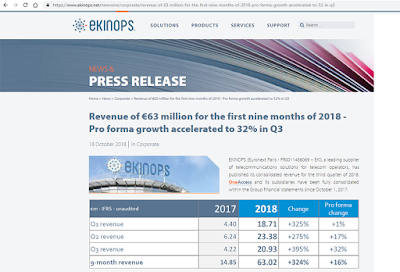NEC and Samsung Electronics are close to announcing a strategic alliance in 5G base stations, according to numerous sources over the weekend.
Samsung is already a key supplier of network infrastructure to KDDI. An alliance with NEC could help open doors to NTT Docomo.
Samsung is already a key supplier of network infrastructure to KDDI. An alliance with NEC could help open doors to NTT Docomo.
KDDI and Samsung prove 5G mmWave works at 190 kmh
KDDI and Samsung Electronics completed a series of 5G tests which demonstrate the viability and performance of 5G millimeter wave mobility solutions while traveling at speeds over 190km per hour.

The demonstration, which took place at 'Everland SPEEDWAY' in Korea, involved a battery of individual tests to examine the performance of Samsung's end-to-end 5G mmWave technology. Specifically, as a vehicle accelerated from 0 to 205km per hour on the race track between multiple 5G base stations, the test measured and evaluated a variety of metrics, including handover interruption time, uplink and downlink throughput stability, and latency stability (or "jitter").
In addition, KDDI and Samsung also demonstrated a successful handover scenario, with Samsung's 5G device attaching to the 5G base station as it approached the service area, and successfully being handed over to the target cell at a speed of 192km per hour (GPS speed).

The demonstration, which took place at 'Everland SPEEDWAY' in Korea, involved a battery of individual tests to examine the performance of Samsung's end-to-end 5G mmWave technology. Specifically, as a vehicle accelerated from 0 to 205km per hour on the race track between multiple 5G base stations, the test measured and evaluated a variety of metrics, including handover interruption time, uplink and downlink throughput stability, and latency stability (or "jitter").
In addition, KDDI and Samsung also demonstrated a successful handover scenario, with Samsung's 5G device attaching to the 5G base station as it approached the service area, and successfully being handed over to the target cell at a speed of 192km per hour (GPS speed).
NEC announces agreement to supply 5G base stations to NTT DOCOMO
NEC announced an agreement to supply 5G base station equipment to NTT DOCOMO. Financial terms were not disclosed. Docomo aims to launch 5G in 2020.
 Under this new agreement, NEC will achieve 5G compatibility through software upgrades and a minimal replacement of hardware to maximize the use of existing high-density base station equipment. NEC said it will provide updates that enable existing high-density base stations to be fully compatible with 5G while continuing to deliver LTE/LTE-Advanced services.
Under this new agreement, NEC will achieve 5G compatibility through software upgrades and a minimal replacement of hardware to maximize the use of existing high-density base station equipment. NEC said it will provide updates that enable existing high-density base stations to be fully compatible with 5G while continuing to deliver LTE/LTE-Advanced services.
This includes base station equipment that NEC has been supplying to DOCOMO since February 2015. This equipment is already compatible with the advanced Centralized Radio Access Network (C-RAN) architecture advocated by
DOCOMO, and is now being utilized as a base station control unit.
"DOCOMO aims to deploy and expand our commercial 5G services efficiently by maximizing the use of existing communications equipment," said, Hiroshi Nakamura, Executive Vice President, Chief Technology Officer and Member of the Board of Directors, NTT DOCOMO. " This agreement with NEC is in line with that policy and we expect it to make a significant contribution to our 5G services. Going forward, DOCOMO accelerates co-creation of new services and businesses with vertical industry partners."
 Under this new agreement, NEC will achieve 5G compatibility through software upgrades and a minimal replacement of hardware to maximize the use of existing high-density base station equipment. NEC said it will provide updates that enable existing high-density base stations to be fully compatible with 5G while continuing to deliver LTE/LTE-Advanced services.
Under this new agreement, NEC will achieve 5G compatibility through software upgrades and a minimal replacement of hardware to maximize the use of existing high-density base station equipment. NEC said it will provide updates that enable existing high-density base stations to be fully compatible with 5G while continuing to deliver LTE/LTE-Advanced services.This includes base station equipment that NEC has been supplying to DOCOMO since February 2015. This equipment is already compatible with the advanced Centralized Radio Access Network (C-RAN) architecture advocated by
DOCOMO, and is now being utilized as a base station control unit.
"DOCOMO aims to deploy and expand our commercial 5G services efficiently by maximizing the use of existing communications equipment," said, Hiroshi Nakamura, Executive Vice President, Chief Technology Officer and Member of the Board of Directors, NTT DOCOMO. " This agreement with NEC is in line with that policy and we expect it to make a significant contribution to our 5G services. Going forward, DOCOMO accelerates co-creation of new services and businesses with vertical industry partners."





















